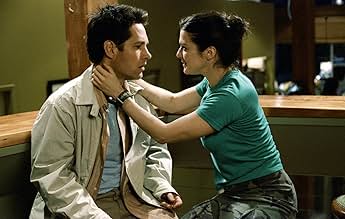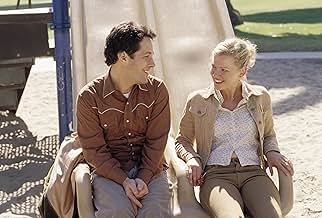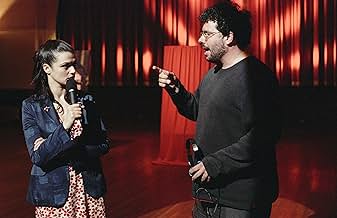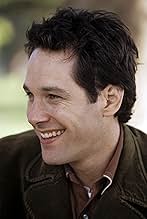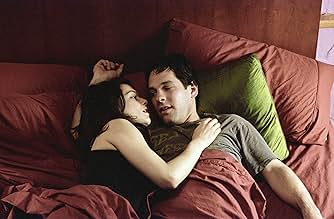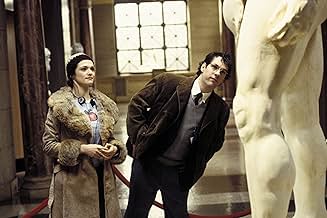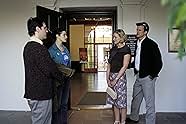NOTE IMDb
6,6/10
12 k
MA NOTE
Ajouter une intrigue dans votre langueA quiet, unassuming man begins to change in a major way as a result of meeting a new, art-student girlfriend, and his friends are unsettled by the transformation.A quiet, unassuming man begins to change in a major way as a result of meeting a new, art-student girlfriend, and his friends are unsettled by the transformation.A quiet, unassuming man begins to change in a major way as a result of meeting a new, art-student girlfriend, and his friends are unsettled by the transformation.
- Récompenses
- 1 nomination au total
Avis à la une
Rachel Weisz seems to be everywhere. From a Soviet partisan in besieged Stalingrad in "Enemy at the Gates" to a self-assured single mom in "About a Boy" and most recently as a grifter in "Confidence," she inhabits her roles with deft assurance.
Here, in Neil La Bute's play-brought-to-the-screen, "The Shape of Things," Weisz is a disturbing, thought-provoking challenging character: an artist in pursuit of a master's degree but in reality a tester of uncharted waters as she combines the creation of art with her relationship with a man who, like a canvas, is transformed from without. In this case by her.
Paul Rudd is Adam, an art gallery guard who Evelyn, the art student, first encounters in a quirky exchange that suggests an unfolding comedy. There are humorous moments but a darker side slowly emerges as Evelyn carefully encourages Adam to shed his dorky exterior. There's nothing new, of course, with the theme, "Change if you love me," but here Adam's relationship with his close friends, Phillip (Fred Weller) and Jenny (very well acted by Gretchen Moll) takes some disturbing turns. Is Evelyn a catalyst or an agitator? Is her commitment to art part of her persona or its sum total? These questions are increasingly explored in this short film. Does the name "Adam" have some esoteric meaning here?
Some plays don't travel well to the screen. This one does. La Bute's play seems to have been little altered by him for a screenplay.
What is the place of ideas and intellectual experimentation in the creation and fostering of an intimate relationship? Are there boundaries that must be respected even if truth is sacrificed in the process? Does art illuminate or camouflage the reality of a relationship? No ready answers and no final ones here but the effort yields a thought-provoking study.
Rachel Weisz's emerging and brooding intensity is the anchor for this unusual film. She also produced the movie.
The score is by Elvis Costello. His fans will appreciate the soundtrack.
8/10.
Here, in Neil La Bute's play-brought-to-the-screen, "The Shape of Things," Weisz is a disturbing, thought-provoking challenging character: an artist in pursuit of a master's degree but in reality a tester of uncharted waters as she combines the creation of art with her relationship with a man who, like a canvas, is transformed from without. In this case by her.
Paul Rudd is Adam, an art gallery guard who Evelyn, the art student, first encounters in a quirky exchange that suggests an unfolding comedy. There are humorous moments but a darker side slowly emerges as Evelyn carefully encourages Adam to shed his dorky exterior. There's nothing new, of course, with the theme, "Change if you love me," but here Adam's relationship with his close friends, Phillip (Fred Weller) and Jenny (very well acted by Gretchen Moll) takes some disturbing turns. Is Evelyn a catalyst or an agitator? Is her commitment to art part of her persona or its sum total? These questions are increasingly explored in this short film. Does the name "Adam" have some esoteric meaning here?
Some plays don't travel well to the screen. This one does. La Bute's play seems to have been little altered by him for a screenplay.
What is the place of ideas and intellectual experimentation in the creation and fostering of an intimate relationship? Are there boundaries that must be respected even if truth is sacrificed in the process? Does art illuminate or camouflage the reality of a relationship? No ready answers and no final ones here but the effort yields a thought-provoking study.
Rachel Weisz's emerging and brooding intensity is the anchor for this unusual film. She also produced the movie.
The score is by Elvis Costello. His fans will appreciate the soundtrack.
8/10.
'The Shape Of Things' gave me the impression of being an unconventional romantic comedy. It starts that way and pretty much stays that way in the first half hour. But, in a very subtle way, director LaBute, as though peeling the story, gradually reveals its darkness. The movie gets darker and darker by the minute and the ending is unsettling as Evelyn's revelation is exposed like an unexpected punch in the stomach. This also makes one question the 'little sacrifices' they make to satisfy their partners and the extent one is willing to go. LaBute has based the film on his play and it seems to have translated well on screen. With fine cinematography, tight editing, soulful score and solid writing, 'The Shape of Things' is certainly well made but what would it have been without its outstanding performances. Rachel Weisz is marvelous as Evelyn the artist. It can be described as a tour du force performance. Being more specific would risk revealing spoilers. Paul Rudd brilliantly suits the role of Adam (the names Adam and Eve(lyn) are an obvious reference that may define their relationship, depending on the viewer's perspective). Frederick Weller is great as Rudd's caddish friend and Gretchen Mol is very good. 'The Shape of Things' is certainly not your average rom-com. In fact, it isn't a rom com at all.
Surprisingly cold satire with too much empty dialog, but you must really appreciate the attitude: the message is against the feel-good-romances as well as against the gender-politics. If you feel betrayed just because Rachel W says everything you loved was actually art and performance under construction, the film was worth of seeing. And you should note that the "art gallery" in the end of the film has nothing to do with art itself... the meaning of this metaphorical place you can decide yourself.
It may not be a good example of play adaptation, but there really should be more films like this with good self- consciousness, and also more actors like Rachel W who understand the point of irony.
It may not be a good example of play adaptation, but there really should be more films like this with good self- consciousness, and also more actors like Rachel W who understand the point of irony.
After the first 30 minutes I felt like the film lacked energy. The pace was a little too slow for my taste, and the intensity too low. I wanted it to be snappier, more sizzling.
But then, about halfway through, it got really interesting. The second half, although it still suffers from some pacing problems, makes up for the first. And then the third act is one of the most brilliant and satisfying third acts I saw in a long time. The ending brings together all of the elements and themes that were planted throughout the movie (our obsession with the way things look, the line between art and real life) to form insights about our lives that are as brutal as they are true.
I am generally fond of Neil LaBute's work - most of the time his works contain more than what they initially seem to be (I haven't see "The Wicker Man" remake yet, but I heard it was horrible). Here, what starts off as your run-of-the-mill romantic comedy/drama, develops into a cynic's paradise, presenting insights into our lives which are as brutal as they are true.
Three of the four actors do a splendid job (Weisz, Rudd & Mol). I especially liked Paul Rudd's performance, and the way his character changes throughout. All three, and especially Rachel Weisz, are convincing in their roles, and deliver multi-layered performances with lots of subtext. Fred Weller's performance leaves something to be desired, but the fact that his role is well written somewhat makes up for that. LaBute has successfully made all four characters three-dimensional and they feel like real people.
Overall, I'd say it was a pretty great movie, certainly entertaining, and an important one to watch and analyze if you are into writing, directing or acting. Somewher, though, I feel like it didn't live up to its full potential. This script, if directed with more intensity, could have become one of my favorite movies, up there with films such as "Closer", "Glengary Glen Ross" or "Oleanna". Maybe it's the transition from the stage to the screen that made LaBute feel like he should make everything more minimalistic and restrained. But it's definitely worth checking out.
But then, about halfway through, it got really interesting. The second half, although it still suffers from some pacing problems, makes up for the first. And then the third act is one of the most brilliant and satisfying third acts I saw in a long time. The ending brings together all of the elements and themes that were planted throughout the movie (our obsession with the way things look, the line between art and real life) to form insights about our lives that are as brutal as they are true.
I am generally fond of Neil LaBute's work - most of the time his works contain more than what they initially seem to be (I haven't see "The Wicker Man" remake yet, but I heard it was horrible). Here, what starts off as your run-of-the-mill romantic comedy/drama, develops into a cynic's paradise, presenting insights into our lives which are as brutal as they are true.
Three of the four actors do a splendid job (Weisz, Rudd & Mol). I especially liked Paul Rudd's performance, and the way his character changes throughout. All three, and especially Rachel Weisz, are convincing in their roles, and deliver multi-layered performances with lots of subtext. Fred Weller's performance leaves something to be desired, but the fact that his role is well written somewhat makes up for that. LaBute has successfully made all four characters three-dimensional and they feel like real people.
Overall, I'd say it was a pretty great movie, certainly entertaining, and an important one to watch and analyze if you are into writing, directing or acting. Somewher, though, I feel like it didn't live up to its full potential. This script, if directed with more intensity, could have become one of my favorite movies, up there with films such as "Closer", "Glengary Glen Ross" or "Oleanna". Maybe it's the transition from the stage to the screen that made LaBute feel like he should make everything more minimalistic and restrained. But it's definitely worth checking out.
This film was absolutely not what I expected it to be. In the first half an hour, I even got a little bored, because it seemed like the story was going nowhere. Fortunately, I got my happy ending - no, not at all a film with a happy ending, just an ending that makes the film precious! It really makes you stare at the black screen, with the cast moving in front, and think about what you've seen over and over again. Of course, the brilliant play of Rachel Weisz cannot be left unmentioned, but I think that the others did a great job as well. "The Shape of things" is a film with actually just four actors and one great idea, and trust me, it is worth seeing. I am just wondering how would I feel the second time I watch it!
Le saviez-vous
- AnecdotesWas originally a play starring Paul Rudd and Rachel Weisz, which played in London in the summer of 2001.
- GaffesIn the park scene where Adam and Jenny kiss, Adam's nose looks normal, but at this point he hasn't had the surgery yet. The surgery happens in the next scene.
- ConnexionsFeatured in Cleanflix (2009)
- Bandes originalesLover's Walk
Written by Elvis Costello
Performed by Elvis Costello and The Attractions
Courtesy of Demon Music Group, Ltd., by Elvis Costello
By Arrangement with Rhino Entertainment Co. and Warner Special Products
Meilleurs choix
Connectez-vous pour évaluer et suivre la liste de favoris afin de recevoir des recommandations personnalisées
- How long is The Shape of Things?Alimenté par Alexa
Détails
- Date de sortie
- Pays d’origine
- Langue
- Aussi connu sous le nom de
- The Shape of Things
- Lieux de tournage
- Sociétés de production
- Voir plus de crédits d'entreprise sur IMDbPro
Box-office
- Budget
- 4 000 000 $US (estimé)
- Montant brut aux États-Unis et au Canada
- 735 992 $US
- Week-end de sortie aux États-Unis et au Canada
- 173 246 $US
- 11 mai 2003
- Montant brut mondial
- 826 617 $US
- Durée1 heure 36 minutes
- Couleur
- Mixage
- Rapport de forme
- 2.35 : 1
Contribuer à cette page
Suggérer une modification ou ajouter du contenu manquant

Lacune principale
By what name was Fausses apparences (2003) officially released in India in English?
Répondre


